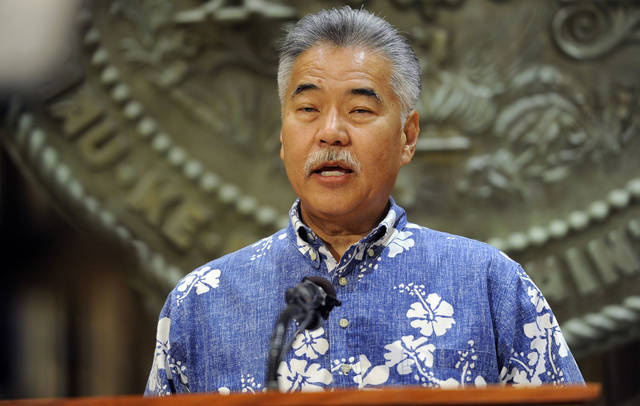Hawaii lawmakers, others urge passage of asset forfeiture bill
State Rep. Joy San Buenaventura of Puna said Tuesday civil asset forfeiture reform legislation she sponsored is in response to innocent people whose property was seized because of legalized theft by the government.
State Rep. Joy San Buenaventura of Puna said Tuesday civil asset forfeiture reform legislation she sponsored is in response to “innocent people whose property was seized because of legalized theft by the government.”
Gov. David Ige said June 24 he intends to veto House Bill 748, which was unanimously passed by the Legislature. The measure would require a felony conviction before law enforcement can seize an individual’s property in a criminal case.
ADVERTISING
The bill also would funnel proceeds from the sale of seized property to the state’s general fund.
Currently, a quarter of seizure proceeds goes to the law enforcement unit or units that conducted the investigation that led to the seizure. Another quarter goes to the office of the prosecutor who instituted the forfeiture action. Half is deposited into a criminal forfeiture fund administered by the state attorney general’s office.
In his rationale for vetoing the measure, Ige called civil asset forfeiture “an effective and critical law enforcement tool that prevents the economic benefits of committing a crime from outweighing consequential criminal penalties and punishment.”
“This measure would also abolish civil asset forfeiture related to serious misdemeanor and petty misdemeanor crimes that negatively impact our society, natural resources and environment. Furthermore, safeguards presently exist in Hawaii’s asset forfeiture statutes that prevent the abuses cited in the bill,” Ige said in a statement.
San Buenaventura called the civil asset forfeiture program as it currently exists “policing for profit.” Her comments were made during a news conference at the state Capitol rotunda sponsored by the American Civil Liberties Union of Hawaii.
Mandy Fernandes, ACLU Hawaii’s policy director, called the bill — which was co-sponsored by Big Island Rep. Chris Todd and Oahu Reps. Chris Lee, Tom Brower, John Mizuno and Dee Morikawa, all Democrats — “one of the most significant civil rights bills to pass out of the 2019 legislative session.” Fernandes noted property seizure can occur in Hawaii “without ever even (charging) a property owner with a criminal offense.”
“We all have the same request of Gov. Ige: Don’t veto this bill,” Fernandes said.
A 2018 Hawaii legislative auditor’s report found that in fiscal year 2015, 26% of property seized was done so without a corresponding criminal charge being filed and 4% took place although criminal charges were dismissed.
According to the report, between fiscal years 2006 and 2015, $11.5 million in private assets were seized, including $2.7 million in cash, $2.45 million in vehicles, $1.267 million in real property and more than $5 million in what was termed “multiple” and “miscellaneous” assets.
The Institute for Justice, an Arlington, Va.-based think tank, gave Hawaii a D-minus grade for its civil forfeiture laws, calling them “among the nation’s worst.” It criticized what it called the state’s “low standard of proof, requiring only that the government show by a preponderance of the evidence that property is tied to a crime” — instead of the standard of innocent until proven guilty, the requirement in a criminal trial.
“Furthermore, innocent owners bear the burden of proving that they had nothing to do with the alleged crime giving rise to the forfeiture,” the organization stated. “Most troubling, law enforcement has a large financial stake in forfeiture, receiving 100 percent of civil forfeiture proceeds … .”
Property owners facing civil forfeiture proceedings don’t have the right to an attorney, as they would in a criminal case. And before a property owner can file a court challenge to a seizure, they are required to file a claim and post a bond of either $2,500 or 10% of the property’s value — whichever is greater.
Rhode Island and Tennessee are the only other states requiring owners of seized assets to post a bond prior to having their case heard.
At least three states — Nebraska, North Carolina and New Mexico — abolished civil forfeiture, and 15 states now require a criminal conviction for most or all forfeiture cases. Thirty-three instituted some sort of asset forfeiture reform in the past five years.
During the legislative session, law enforcement agencies submitted written testimony opposed to the bill.
In a letter, Hawaii Police Chief Paul Ferreira called forfeiture “a community tool meant to discourage nefarious acts committed upon our populace.”
“The changes as proposed by this legislation would significantly compromise law enforcement’s ability to combat those who profit from illegal activity through victimization of the community at large,” the chief said.
Hawaii County Prosecutor Mitch Roth in February called forfeiture “one of the tools that keeps our communities safer and healthier” and said changes in the law “will make it a lot more difficult to go after drug dealers and other criminals.”
“When we deal with forfeiture, we take away the drug dealers’ money,” Roth said. “We often make a bigger imprint than when we try to put them in prison, as we don’t have enough prison space.”
In addition to ACLU Hawaii, the measure has the support of the LGBT Caucus of the Democratic Party of Hawaii, the Drug Policy Alliance and the Drug Policy Forum of Hawaii.
“Innocent until proven guilty and the right to be secure in one’s property and possessions — these are fundamental hallmarks of our Constitution,” said Niko Leverenz, president of the Drug Policy Forum of Hawaii, during the news conference. “And as currently practiced … civil asset forfeiture incentivizes law enforcement to police for profit. And in response, legislatures throughout the United States have embarked on reforms.”
Ige has until July 9 to act on HB 748. If he doesn’t veto the measure or sign it into law, it becomes law without his signature.
Email John Burnett at jburnett@hawaiitribune-herald.com.




